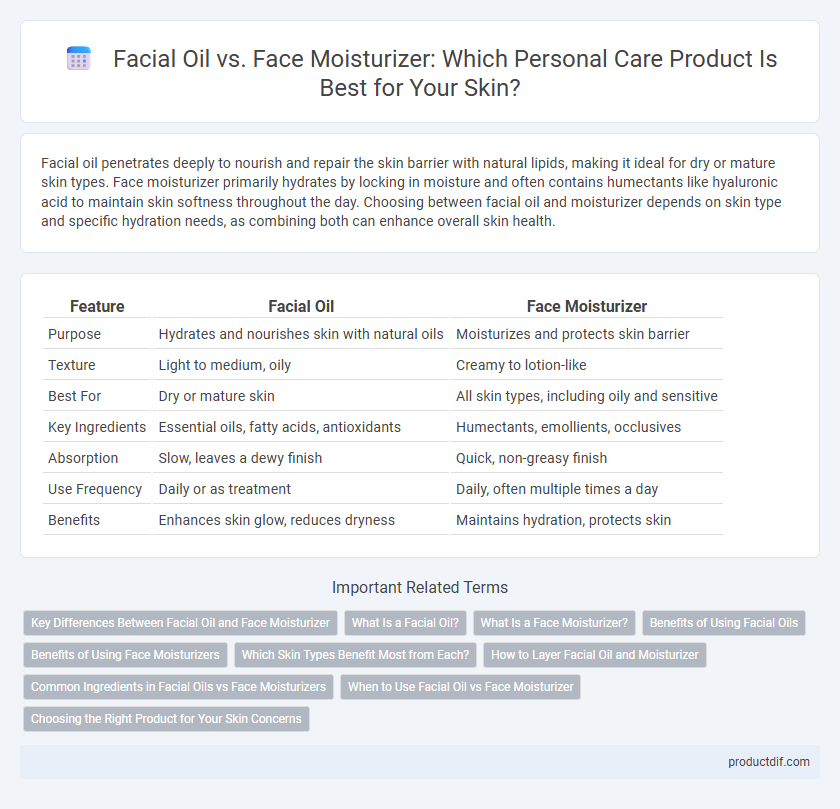Facial oil penetrates deeply to nourish and repair the skin barrier with natural lipids, making it ideal for dry or mature skin types. Face moisturizer primarily hydrates by locking in moisture and often contains humectants like hyaluronic acid to maintain skin softness throughout the day. Choosing between facial oil and moisturizer depends on skin type and specific hydration needs, as combining both can enhance overall skin health.
Table of Comparison
| Feature | Facial Oil | Face Moisturizer |
|---|---|---|
| Purpose | Hydrates and nourishes skin with natural oils | Moisturizes and protects skin barrier |
| Texture | Light to medium, oily | Creamy to lotion-like |
| Best For | Dry or mature skin | All skin types, including oily and sensitive |
| Key Ingredients | Essential oils, fatty acids, antioxidants | Humectants, emollients, occlusives |
| Absorption | Slow, leaves a dewy finish | Quick, non-greasy finish |
| Use Frequency | Daily or as treatment | Daily, often multiple times a day |
| Benefits | Enhances skin glow, reduces dryness | Maintains hydration, protects skin |
Key Differences Between Facial Oil and Face Moisturizer
Facial oil consists of concentrated plant-based oils that provide deep hydration and nourishment by penetrating the skin's barrier, while face moisturizer primarily contains water-based ingredients designed to lock in moisture and maintain skin's hydration levels. Facial oils are rich in fatty acids and antioxidants, ideal for repairing dry or mature skin, whereas moisturizers often include humectants like hyaluronic acid and occlusives such as glycerin to create a protective layer on the skin surface. The key difference lies in formulation and function: oils replenish natural lipids and promote barrier repair, whereas moisturizers prevent water loss and offer lightweight hydration suitable for all skin types.
What Is a Facial Oil?
Facial oil is a concentrated skincare product rich in natural oils and antioxidants designed to nourish and hydrate the skin by replenishing its lipid barrier. Unlike face moisturizers, which primarily contain water-based ingredients to provide surface hydration, facial oils penetrate deeper to lock in moisture and improve skin elasticity. Common facial oils include jojoba, rosehip, and argan oil, each offering unique benefits such as anti-inflammatory properties and essential fatty acids for healthier, glowing skin.
What Is a Face Moisturizer?
A face moisturizer is a skincare product formulated to hydrate and protect the skin by creating a barrier that locks in moisture and prevents dryness. It typically contains ingredients like humectants, emollients, and occlusives to maintain skin's softness and suppleness. Unlike facial oils, moisturizers are designed for all skin types and provide balanced hydration without overwhelming the skin's natural oils.
Benefits of Using Facial Oils
Facial oils provide deep hydration and nourishment by penetrating the skin's barrier, delivering essential fatty acids and antioxidants that enhance skin elasticity and reduce inflammation. Unlike traditional face moisturizers, facial oils create a protective layer that helps retain moisture and improve the skin's natural glow. They are especially beneficial for dry, sensitive, or aging skin types seeking targeted repair and long-lasting hydration.
Benefits of Using Face Moisturizers
Face moisturizers provide essential hydration by forming a protective barrier that locks in moisture, preventing dryness and irritation. They often contain ingredients like hyaluronic acid, glycerin, and ceramides that support skin repair and improve elasticity. Regular use of face moisturizers helps maintain a balanced skin barrier, reducing the risk of premature aging and promoting a smoother, healthier complexion.
Which Skin Types Benefit Most from Each?
Facial oils are highly beneficial for dry and mature skin types, providing deep hydration and replenishing essential fatty acids to restore the skin barrier. Face moisturizers, often formulated with humectants and emollients, suit oily and combination skin by balancing moisture without clogging pores. Sensitive skin may benefit from gentle, fragrance-free moisturizers that soothe irritation, while lightweight facial oils with non-comedogenic properties work well for normal skin.
How to Layer Facial Oil and Moisturizer
Apply face moisturizer first to lock in hydration and create a smooth base for the facial oil. Gently pat a few drops of facial oil over the moisturizer to seal in moisture and enhance skin nourishment. Layering in this order optimizes absorption and provides long-lasting hydration for all skin types.
Common Ingredients in Facial Oils vs Face Moisturizers
Facial oils commonly contain natural oils such as jojoba, argan, and rosehip, rich in fatty acids and antioxidants that nourish and protect the skin barrier, while face moisturizers often include ingredients like hyaluronic acid, glycerin, and ceramides to provide hydration and lock in moisture. Essential oils and vitamins like vitamin E are frequently found in facial oils, offering antioxidant benefits, whereas moisturizers may also contain emollients and occlusives that help maintain skin elasticity and prevent water loss. Understanding the different ingredient profiles helps consumers select the best product based on their skin type and hydration needs.
When to Use Facial Oil vs Face Moisturizer
Facial oil is best used when your skin feels dry, flaky, or in need of extra nourishment due to its rich, hydrating properties that help lock in moisture. Face moisturizer is ideal for daily use to maintain skin hydration and protect the skin barrier, especially for normal to oily skin types. Combining both products by applying moisturizer first and facial oil afterward maximizes hydration and supports skin health in varying climates and conditions.
Choosing the Right Product for Your Skin Concerns
Facial oils provide deep nourishment and are ideal for dry or mature skin with concerns like fine lines and dullness, while face moisturizers offer hydration and barrier protection suitable for oily or acne-prone skin. Ingredients such as jojoba oil, rosehip, or argan oil in facial oils target specific skin concerns by delivering antioxidants and essential fatty acids, whereas moisturizers containing hyaluronic acid, ceramides, or glycerin hydrate and repair the skin's moisture barrier. Selecting the right product depends on your skin type, addressing issues like dehydration, sensitivity, or excess oil to optimize skin health and appearance.
Facial Oil vs Face Moisturizer Infographic

 productdif.com
productdif.com